TypeError: 'tuple' object does not support item assignment
Last updated: Apr 8, 2024 Reading time · 4 min


# TypeError: 'tuple' object does not support item assignment
The Python "TypeError: 'tuple' object does not support item assignment" occurs when we try to change the value of an item in a tuple.
To solve the error, convert the tuple to a list, change the item at the specific index and convert the list back to a tuple.

Here is an example of how the error occurs.
We tried to update an element in a tuple, but tuple objects are immutable which caused the error.
# Convert the tuple to a list to solve the error
We cannot assign a value to an individual item of a tuple.
Instead, we have to convert the tuple to a list.
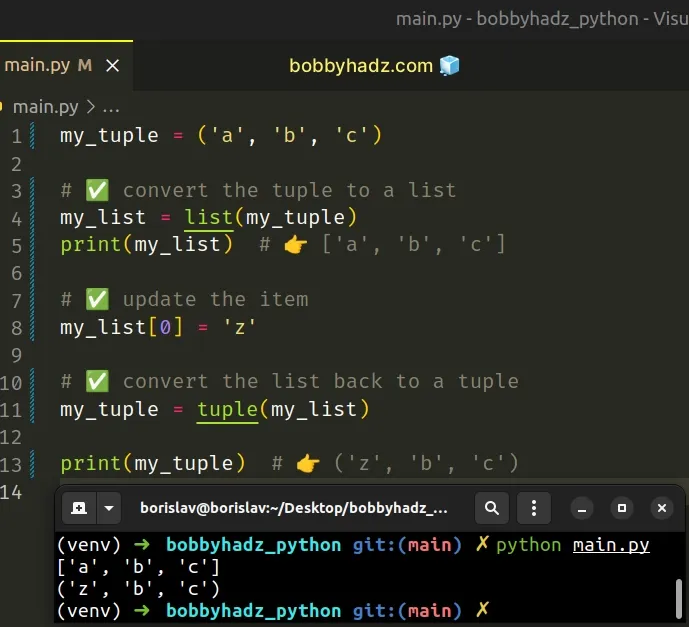
This is a three-step process:
- Use the list() class to convert the tuple to a list.
- Update the item at the specified index.
- Use the tuple() class to convert the list back to a tuple.
Once we have a list, we can update the item at the specified index and optionally convert the result back to a tuple.
Python indexes are zero-based, so the first item in a tuple has an index of 0 , and the last item has an index of -1 or len(my_tuple) - 1 .
# Constructing a new tuple with the updated element
Alternatively, you can construct a new tuple that contains the updated element at the specified index.
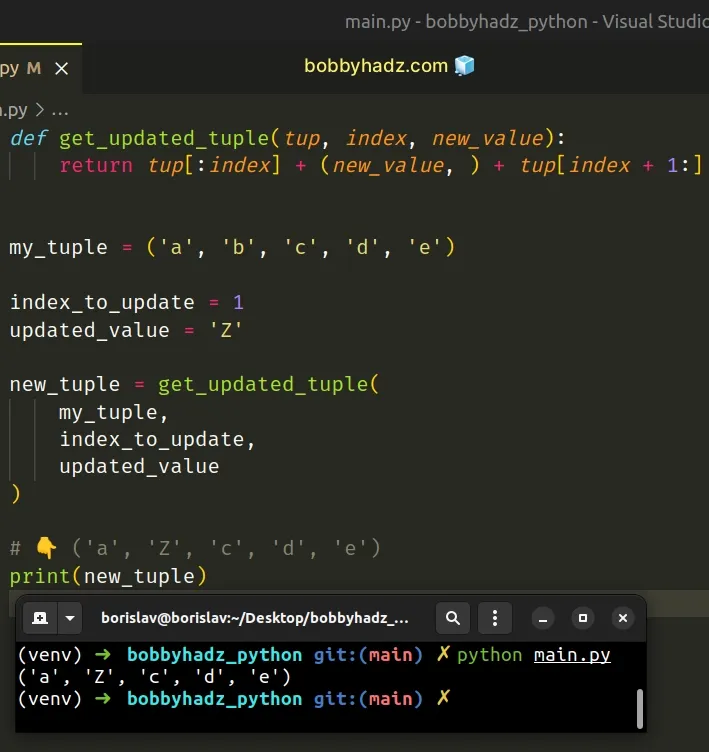
The get_updated_tuple function takes a tuple, an index and a new value and returns a new tuple with the updated value at the specified index.
The original tuple remains unchanged because tuples are immutable.
We updated the tuple element at index 1 , setting it to Z .
If you only have to do this once, you don't have to define a function.
The code sample achieves the same result without using a reusable function.
The values on the left and right-hand sides of the addition (+) operator have to all be tuples.
The syntax for tuple slicing is my_tuple[start:stop:step] .
The start index is inclusive and the stop index is exclusive (up to, but not including).
If the start index is omitted, it is considered to be 0 , if the stop index is omitted, the slice goes to the end of the tuple.
# Using a list instead of a tuple
Alternatively, you can declare a list from the beginning by wrapping the elements in square brackets (not parentheses).
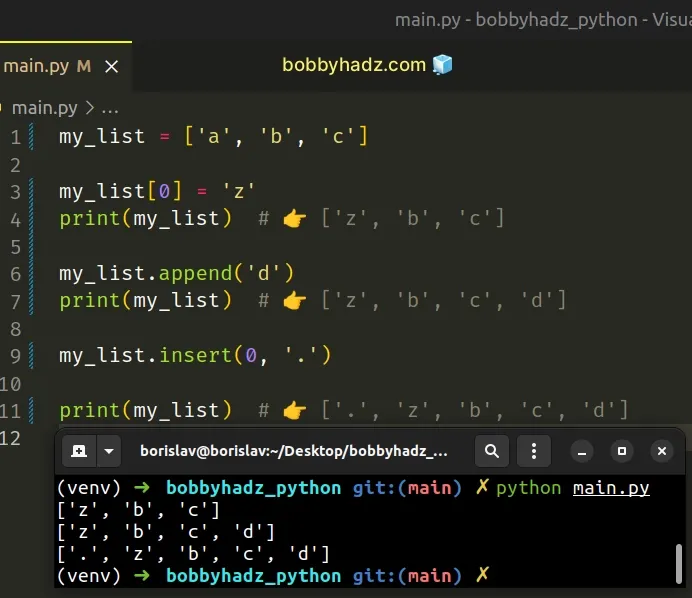
Declaring a list from the beginning is much more efficient if you have to change the values in the collection often.
Tuples are intended to store values that never change.
# How tuples are constructed in Python
In case you declared a tuple by mistake, tuples are constructed in multiple ways:
- Using a pair of parentheses () creates an empty tuple
- Using a trailing comma - a, or (a,)
- Separating items with commas - a, b or (a, b)
- Using the tuple() constructor
# Checking if the value is a tuple
You can also handle the error by checking if the value is a tuple before the assignment.
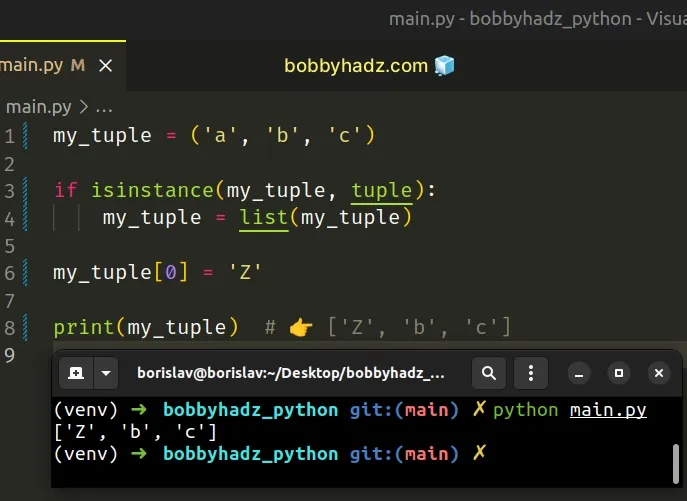
If the variable stores a tuple, we set it to a list to be able to update the value at the specified index.
The isinstance() function returns True if the passed-in object is an instance or a subclass of the passed-in class.
If you aren't sure what type a variable stores, use the built-in type() class.
The type class returns the type of an object.
# Additional Resources
You can learn more about the related topics by checking out the following tutorials:
- How to convert a Tuple to an Integer in Python
- How to convert a Tuple to JSON in Python
- Find Min and Max values in Tuple or List of Tuples in Python
- Get the Nth element of a Tuple or List of Tuples in Python
- Creating a Tuple or a Set from user Input in Python
- How to Iterate through a List of Tuples in Python
- Write a List of Tuples to a File in Python
- AttributeError: 'tuple' object has no attribute X in Python
- TypeError: 'tuple' object is not callable in Python [Fixed]

Borislav Hadzhiev
Web Developer

Copyright © 2024 Borislav Hadzhiev
CodeFatherTech
Learn to Code. Shape Your Future
Tuple Object Does Not Support Item Assignment. Why?
Have you ever seen the error “tuple object does not support item assignment” when working with tuples in Python? In this article we will learn why this error occurs and how to solve it.
The error “tuple object does not support item assignment” is raised in Python when you try to modify an element of a tuple. This error occurs because tuples are immutable data types. It’s possible to avoid this error by converting tuples to lists or by using the tuple slicing operator.
Let’s go through few examples that will show you in which circumstances this error occurs and what to do about it.
Let’s get started!
Explanation of the Error “Tuple Object Does Not Support Item Assignment”
Define a tuple called cities as shown below:
If you had a list you would be able to update any elements in the list .
But, here is what happens if we try to update one element of a tuple:
Tuples are immutable and that’s why we see this error.
There is a workaround to this, we can:
- Convert the tuple into a list.
- Update any elements in the list.
- Convert the final list back to a tuple.
To convert the tuple into a list we will use the list() function :
Now, let’s update the element at index 1 in the same way we have tried to do before with the tuple:
You can see that the second element of the list has been updated.
Finally, let’s convert the list back to a tuple using the tuple() function :
Makes sense?
Avoid the “Tuple Object Does Not Support Item Assignment” Error with Slicing
The slicing operator also allows to avoid this error.
Let’s see how we can use slicing to create a tuple from our original tuple where only one element is updated.
We will use the following tuple and we will update the value of the element at index 2 to ‘Rome’.
Here is the result we want:
We can use slicing and concatenate the first two elements of the original tuple, the new value and the last two elements of the original tuple.
Here is the generic syntax of the slicing operator (in this case applied to a tuple).
This takes a slice of the tuple including the element at index n and excluding the element at index m .
Firstly, let’s see how to print the first two and last two elements of the tuple using slicing…
First two elements
We can also omit the first zero considering that the slice starts from the beginning of the tuple.
Last two elements
Notice that we have omitted index m considering that the slice includes up to the last element of the tuple.
Now we can create the new tuple starting from the original one using the following code:
(‘Rome’,) is a tuple with one element of type string.
Does “Tuple Object Does Not Support Item Assignment” Apply to a List inside a Tuple?
Let’s see what happens when one of the elements of a tuple is a list.
If we try to update the second element of the tuple we get the expected error:
If we try to assign a new list to the third element…
…once again we get back the error “‘ tuple’ object does not support item assignment “.
But if we append another number to the list inside the tuple, here is what happens:
The Python interpreter doesn’t raise any exceptions because the list is a mutable data type.
This concept is important for you to know when you work with data types in Python:
In Python, lists are mutable and tuples are immutable.
How to Solve This Error with a List of Tuples
Do we see this error also with a list of tuples?
Let’s say we have a list of tuples that is used in a game to store name and score for each user:
The user John has gained additional points and I want to update the points associated to his user:
When I try to update his points we get back the same error we have seen before when updating a tuple.
How can we get around this error?
Tuples are immutable but lists are mutable and we could use this concept to assign the new score to a new tuple in the list, at the same position of the original tuple in the list.
So, instead of updating the tuple at index 0 we will assign a new tuple to it.
Let’s see if it works…
It does work! Once again because a list is mutable .
And here is how we can make this code more generic?
Ok, this is a bit more generic because we didn’t have to provide the name of the user when updating his records.
This is just an example to show you how to address this TypeError , but in reality in this scenario I would prefer to use a dictionary instead.
It would allow us to access the details of each user from the name and to update the score without any issues.
Tuple Object Does Not Support Item Assignment Error With Values Returned by a Function
This error can also occur when a function returns multiple values and you try to directly modify the values returned by the function.
I create a function that returns two values: the number of users registered in our application and the number of users who have accessed our application in the last 30 days.
As you can see the two values are returned by the function as a tuple.
So, let’s assume there is a new registered user and because of that I try to update the value returned by the function directly.
I get the following error…
This can happen especially if I know that two values are returned by the function but I’m not aware that they are returned in a tuple.
Why Using Tuples If We Get This Error?
You might be thinking…
What is the point of using tuples if we get this error every time we try to update them?
Wouldn’t be a lot easier to always use lists instead?
We can see the fact that tuples are immutable as an added value for tuples when we have some data in our application that should never be modified.
Let’s say, for example, that our application integrates with an external system and it needs some configuration properties to connect to that system.
The tuple above contains two values: the API endpoint of the system we connect to and the port for their API.
We want to make sure this configuration is not modified by mistake in our application because it would break the integration with the external system.
So, if our code inadvertently updates one of the values, the following happens:
Remember, it’s not always good to have data structures you can update in your code whenever you want.
In this article we have seen when the error “tuple object does not support item assignment” occurs and how to avoid it.
You have learned how differently the tuple and list data types behave in Python and how you can use that in your programs.
If you have any questions feel free to post them in the comment below 🙂

Claudio Sabato is an IT expert with over 15 years of professional experience in Python programming, Linux Systems Administration, Bash programming, and IT Systems Design. He is a professional certified by the Linux Professional Institute .
With a Master’s degree in Computer Science, he has a strong foundation in Software Engineering and a passion for robotics with Raspberry Pi.
Related posts:
- Python TypeError: int object is not iterable: What To Do To Fix It?
- Python Unexpected EOF While Parsing: The Way To Fix It
- Python AttributeError: Fix This Built-in Exception
- Understand the “str object is not callable” Python Error and Fix It!
Leave a Comment Cancel reply
Save my name, email, and website in this browser for the next time I comment.

- Privacy Overview
- Strictly Necessary Cookies
This website uses cookies so that we can provide you with the best user experience possible. Cookie information is stored in your browser and performs functions such as recognising you when you return to our website and helping our team to understand which sections of the website you find most interesting and useful.
Strictly Necessary Cookie should be enabled at all times so that we can save your preferences for cookie settings.
If you disable this cookie, we will not be able to save your preferences. This means that every time you visit this website you will need to enable or disable cookies again.
Solve Python TypeError: 'tuple' object does not support item assignment
by Nathan Sebhastian
Posted on Dec 26, 2022
Reading time: 2 minutes

In Python, tuples are immutable sequences that cannot be modified once they are created. This means that you cannot change, add, or delete elements from a tuple.
When you try to modify a tuple using the square brackets and the assignment operator, you will get the “TypeError: ’tuple’ object does not support item assignment” error.
Consider the example below:
The above code tries to change the first element of the tuple from “Orange” to “Mango”.
But since a tuple is immutable, Python will respond with the following error:
There are two solutions you can use to edit a tuple in Python.
Solution #1: Change the tuple to list first
When you need to modify the elements of a tuple, you can convert the tuple to a list first using the list() function.
Lists are mutable sequences that allow you to change, add, and delete elements.
Once you have made the changes to the list, you can convert it back to a tuple using the tuple() function:
By converting a tuple into a list, you can modify its elements. Once done, convert it back to a tuple.
Solution #2: Create a new tuple
When you only need to modify a single element of a tuple, you can create a new tuple with the modified element.
To access a range of elements from a tuple, you can use the slice operator.
For example, the following code creates a new tuple by adding a slice of elements from an existing tuple:
The code fruits[1:] means you are slicing the fruits tuple to return the second element to the last.
Creating a new tuple is more efficient than converting the entire tuple to a list and back as it requires only one line of code.
But this solution doesn’t work when you need a complex modification.
The Python TypeError: tuple object does not support item assignment issue occurs when you try to modify a tuple using the square brackets (i.e., [] ) and the assignment operator (i.e., = ).
A tuple is immutable, so you need a creative way to change, add, or remove its elements.
This tutorial shows you two easy solutions on how to change the tuple object element(s) and avoid the TypeError.
Thanks for reading. I hope this helps! 🙏
Take your skills to the next level ⚡️
I'm sending out an occasional email with the latest tutorials on programming, web development, and statistics. Drop your email in the box below and I'll send new stuff straight into your inbox!
Hello! This website is dedicated to help you learn tech and data science skills with its step-by-step, beginner-friendly tutorials. Learn statistics, JavaScript and other programming languages using clear examples written for people.
Learn more about this website
Connect with me on Twitter
Or LinkedIn
Type the keyword below and hit enter
Click to see all tutorials tagged with:

How to Fix the Error “Cannot Set Headers After They are Sent to the Client” in JavaScript?

How to Fix “Type ‘Null’ Is Not Assignable to Type ‘String’” in TypeScript?

How to Fix the Java “Package Does Not Exist” Error?
Recent posts.

How to Fix “ReferenceError: Variable Is Not Defined” in JavaScript?
- WooCommerce
- Webpack warning
How to Fix “TypeError: Tuple Does Not Support Item Assignment” in Python?
Did you assign a tuple to a new value and get the TypeError: tuple does not support item assignment in Python?
If you’re working with Python and you encounter the “TypeError: ‘tuple’ does not support item assignment” error, it means that you are trying to change the value of an element within a tuple, which is not possible.
When we try to update the value of an item in a tuple, Python throws the error TypeError: ‘tuple’ object does not support item assignment . Tuples are immutable data types, hence assigning a tuple to a variable or data causes the TypeError exception . Transforming tuples to lists or slicing them, can be helpful in preventing the TypeError: ‘tuple’ object does not support item assignment .
Furthermore, you can convert the tuple to a list, to make the necessary changes, and then convert the list back to a tuple to fix the problem.
In this article, we’ll discuss the TypeError: tuple object does not support item assignment in Python, why it occurs, and how to fix ⚒️it. So without further ado, let’s dive deep into the topic. Let’s go over a few examples that will show this error’s causes and possible solutions.
Table of Contents
Why does the typeerror: tuple does not support item assignment error occur, how to fix typeerror: ‘tuple’ object does not support item assignment in python, 1. assigning a value to the index, 2. with the use of slice operator, 3. apply list inside a tuple.
As we’ve discussed in Python, when we try to assign a new value to a tuple that causes TypeError: tuple object does not support item assignment. Let’s see an example 👇

See the above example; we have created a tuple Tuple_1 and assigned values. Then we assigned “Kelvin” at index 2 of Tuple and print the tuple that gives the TypeError: tuple does not support item assignment as we are trying to assign a value to an already created tuple.
As we have seen in the above example, we have created a tuple and assigned a value, we can convert the tuple into a list, and then we can assign values to it. To convert a tuple into a list, we utilized the list() class. In the above example, we have assigned 1.
To fix the error first we have to change the tuple to a list: we have three different alternate solutions.
- Assigning a Value to the Index
- With the Use of Slice Operator
- Apply List Inside a Tuple
We have to convert Convert the tuple into a list by using a list function and then assigning a value at any index of a list that will update any elements in the list. The final step is to convert
final list back to a tuple as shown in the following example.
In the above example, we have converted the tuple to a list, assigned “Sofia” at the index on the list, and again converted the list to a tuple and printed it.
This “Type error: tuple object does not support item assignment” can also be avoided using the slicing operator. Let’s look at how we can slice our original tuple to get a new one after omitting some elements of the tuple. You can also add an element to any index after in the tuple using the slice operator.
If one element in a tuple is listed, only on that particular index we can assign another element. But if we assign an element at the index of an element that is not a list it will generate a “Type error: tuple object does not support item assignment.” Let’s see what happens when a tuple has a list as one of its elements.
To summarize the article on how to fix the TypeError: tuple does not support item assignment , we’ve discussed why it occurs and how to fix it. Furthermore, we’ve seen that the three approaches that help fix the TypeError: ‘tuple’ object do not support item assignment , including Assigning a value to the index, With the use of slice Operator, Applying a list inside a tuple
Let’s have a quick recap of the topics discussed in this article.
- Why does the TypeError: ‘tuple’ object does not support item assignment occurs?
- How to fix the TypeError TypeError: tuple does not support item assignment in Python?
- Assigning a value to the index.
- With the use of slice Operator.
- Apply List inside a Tuple.
If you’ve found this article helpful, don’t forget to share and comment below 👇 which solutions have helped you solve the problem.
Happy Coding!
Leave a Reply Cancel reply
Your email address will not be published. Required fields are marked *
Save my name, email, and website in this browser for the next time I comment.
Related Posts


How to Fix “AttributeError: ‘Series’ Object Has No Attribute ‘Reshape'” in Python?

How to Fix “TypeError: ‘Float’ Object Cannot be Interpreted as an Integer” in Python?

How to Convert Dictionary to Pandas DataFrame in Python?
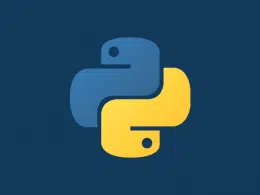
How to Play Sound, Audio or MP3 Files in Python

How to Solve ‘Tuple’ Object Does Not Support Item Assignment (Python)
Here’s everything about TypeError: ‘Tuple’ Object Does Not Support Item Assignment in Python.
You’ll learn:
- The specifics of the tuple data type
- The difference between immutable and mutable data types
- How to change immutable data types
So if you want to understand this error in Python and how to solve it, then you’re in the right place.
Let’s jump right in!
- IndentationError: Unexpected Unindent in Python
- How to Solve ImportError: Attempted Relative Import With No Known Parent Package (Python)
- SyntaxError: Invalid Character in Identifier: How to Solve? (Python)
- 3 Ways to Solve Series Objects Are Mutable and Cannot be Hashed (Python)
- 9 Examples of Unexpected Character After Line Continuation Character (Python)
Mutable, or Immutable? That Is the Question
Data types in Python are mutable or immutable .
All data types that are numeric , for example, are immutable .
You can write something like this:
Have you changed the variable a ?
Not really: When you write a = 1 , you put the object 1 in memory and told the name a to refer to this literal.
Next, when you write a = a + 1 , Python evaluates the expression on the right:
Python takes the object referred by a (the 1 ) and then adds 1 to it.
You get a new object, a 2 . This object goes right into the memory and a references instead of object 1 .
The value of object 1 has not changed—it would be weird if 1 would out of a sudden a 2 , for example, wouldn’t it? So instead of overwriting an object ( 1 ), a new object ( 2 ) is created and assigned to the variable ( a ).
Mutable Data Types
More complex data types in Python are sequences such as:
- Byte Arrays
Sequences contain several values, which can be accessed by index.

However, some sequences are mutable (byte arrays, lists) , while others are immutable (tuples) .
You can create a tuple and access its elements like this:
Yet if you try to change one of the elements, you get an error:
Notice that the item in the tuple at index 2 is a list. You can change the list without changing the tuple:
The object stored in the tuple remains the same, but its contents have changed. But what if you still need to change the element in the tuple?
You can do this by converting the tuple to a list. Then you change the element, and then convert the list to a tuple again:
For large amounts of data, conversion operations can take quite a long time:
As you can see, for a list of 100 million float numbers, this operation takes about a second. This is not a long time for most tasks, but it is still worth considering if you are dealing with large amounts of data.
However, there is another way to “change” a tuple element—you can rebuild a tuple using slicing and concatenation:
Note that it is necessary to put a comma in parentheses to create a tuple of one element. If you use just parentheses, then (‘uno’) is not a tuple, but a string in parentheses .
Concatenating a string with a tuple is not possible:
Interestingly, you can use shorthand operators on a tuple, like this:
Or even like this:
3 Examples of TypeError: ‘Tuple’ Object Does Not Support Item Assignment in Python
Let’s look at some practical examples of when this error can occur. The simplest is when you initially enter the sequence incorrectly:
In this example, the name list1 refers to a tuple despite the list in the name. The name does not affect the type of variable. To fix this error, simply change the parentheses to square brackets in the constructor:
Perhaps you have a list with some values, such as the student’s name and grade point average:
Alice did a poor job this semester, and her GPA dropped to 90:
Unfortunately, you cannot just change the average score in such a list. You already know that you can convert a tuple to a list, or form a new tuple. For example, like this:
However, if you need to change values regularly, it makes sense to switch from a list of tuples to a dictionary. Dictionaries are a perfect fit for such tasks. You can do this easily with the dict() constructor:
Now you can change the average by student name:
#1 Real World Example of TypeError: ‘Tuple’ Object Does Not Support Item Assignment in Python
An interesting example of a novice programmer trying to enter values in a list from the keyboard using the eval() function:
This method is not very reliable by itself.
Even if the user enters the correct sequence separated by commas—for example, 3, 2, 4, 1 —it will be evaluated in a tuple.
Naturally, an attempt to assign a new value to a tuple element in the line list[i +1] = list[i] raises a TypeError: ‘tuple’ object does not support item assignment .
Here, you see another mistake—which, by the way, may even be invisible during program execution.
The my_sort function uses the list data type name as the argument name. This is not only the name of the data type, but also the list constructor.
Python will not throw an error while executing this code, but if you try to create a list using the constructor inside the my_sort function, you will have big problems.

In this case, to enter elements into the list, it would be more correct to read the entire string and then split it using the split() method. If you need integer values, you can also apply the map() function, then convert the resulting map object into a list:
The construction looks a little cumbersome, but it does its job. You can also enter list items through a list comprehension:
You can choose the design that you like best.
#2 Real World Example of TypeError: ‘Tuple’ Object Does Not Support Item Assignment in Python
Another example of when a TypeError: ‘tuple’ object does not support item assignment may occur is the use of various libraries.
If you have not studied the documentation well enough, you may not always clearly understand which data type will be returned in a given situation. In this example, the author tries to make the picture redder by adding 20 to the red color component:
This produces an error on the line pixel[0] = pixel[0] + 20 . How?
You are converting pixels to a list in line of code 3 . Indeed, if you check the type of the pixels variable, you get a list:
However, in the loop, you iterate over the pixels list elements, and they already have a different type. Check the type of the pixels list element with index 0 :
And this is a tuple!
So, you can solve this problem by converting lists to tuples inside a loop, for example.
However, in this case, you will need to slightly adjust the iterable value. This is because you will need the pixel color values and the index to write the new values into the original array.
For this, use the enumerate() function:
The program will work successfully with that version of a loop, and you will get a redder image at the output. It would be more correct to trim values above 255 , for example:
But if the program consists only of this transformation, then Python will already truncate the values when saving the image.
Here’s more Python support:
- 9 Examples of Unexpected Character After Line Continuation Character
- 3 Ways to Solve Series Objects Are Mutable and Cannot be Hashed
- How to Solve SyntaxError: Invalid Character in Identifier
- ImportError: Attempted Relative Import With No Known Parent Package
- IndentationError: Unexpected Unindent in Python (and 3 More)

Tech entrepreneur and founder of Tech Medic, who has become a prominent advocate for the Right to Repair movement. She has testified before the US Federal Trade Commission and been featured on CBS Sunday Morning, helping influence change within the tech industry.
Python TypeError: 'tuple' object does not support item assignment Solution
Posted in PROGRAMMING LANGUAGE / PYTHON
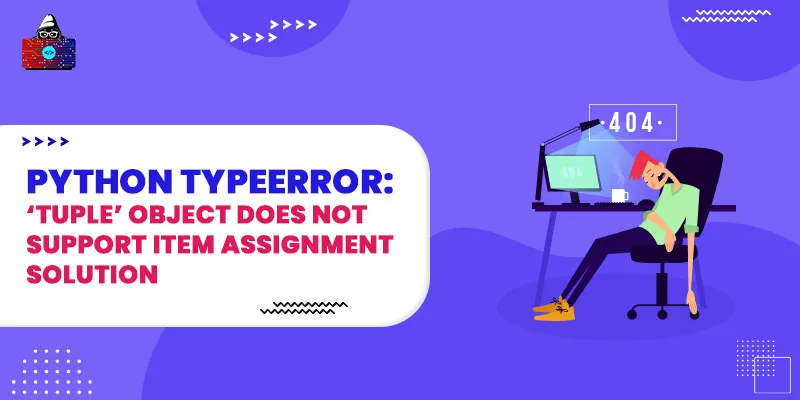
Vinay Khatri Last updated on November 18, 2024
Table of Content
In Python, we have a built-in data structure " tuple " which is similar to a Python list and stores elements in sequential order. The only difference between a Python list and a tuple is that the tuple is an immutable data structure, which means once a tuple object is defined, we can not change its elements. If we try to change the tuple elements using indexing and assignment operator, we will receive the TypeError: 'tuple' object does not support item assignment Error.
In this Python guide, we will discuss this error in detail and learn how to debug it. We will also walk through a common example to demonstrate this error. So without further ado, let's get started with the Error statement.
Python Error: TypeError: 'tuple' object does not support item assignment
The Error Statement TypeError: 'tuple' object does not support item assignment is divided into two parts Exception Type and Error Message.
- TypeError (Exception Type)
- 'tuple' object does not support item assignment (Error Message)
1. TypeError
TypeError is a standard Python exception. It is raised in a Python program when we try to perform an invalid or unsupported operation on a Python object.
2. 'tuple' object does not support item assignment
This error message tells us that the tuple object does not support new value assignment to its elements. You will only encounter this error message when you try to change the values of a tuple element using indexing.
Although we can use indexing to access the individual tuple elements, we can not use indexing to change tuple element values.
Here we are getting this error because in line 5, we are trying to assign a new value to the tuple " letters ". As tuple does not support element change operation, it throws the error when we try to assign a new value to the tuple element. Now let's discuss a common scenario example, and in the solution, we will see an alternative way to debug this problem and add and change the value of a tuple element using some logic.
Common Example Scenario
Tuples are faster as compared to the Python list. That's why many Python developers use tuples to store items or element values. Although tuple supports element access using indexing, it throws an error when changing its elements. This is also one of the main reasons why many pythoneer use tuples instead of lists when they do not want to change the elements of the container throughout the program.
But let's say you come across a situation when you want to change the element value of a tuple, then what would you do?
Here we will discuss an example where we first try to change one of the values of a tuple using indexing. Then in the solution, we will discuss how we can achieve it.
Break the code
The error statement is quite expected. We know that when we try to change the tuple element value using indexing, we get the error. In line 5, we tried to change the first element of the tuple " sem_1_subjects " from "Java" to "Python" , which is the cause of this error statement.
When we use the tuple element as a container to store elements, we think of that container as intact throughout the program. But in the case when we come across a situation where we need to change the value of the tuple elements, there we first need to convert that tuple object to a list using list() function. Then only we can change its values. After changing the value, we can convert back the list object to the tuple using tuple() function.
Example solution
In this Python tutorial, we discussed the "TypeError: 'tuple' object does not support item assignment" Error in detail. This error raises in a Python program when we try to change the value of a tuple element using the assignment operator. A tuple is an immutable data structure, and once we define all its elements, we can not change them. To change its elements, first, need to convert the tuple object to a list, and then only we can change its values.
If you are still getting this error in your Python program, you can share your code in the comment section. We will try to help you in debugging.
People are also reading:
- Python typeerror: ‘str’ object is not callable Solution
- Python SyntaxError: can’t assign to function call Solution
- Python TypeError: ‘method’ object is not subscriptable Solution
- Python typeerror: list indices must be integers or slices, not str Solution
- Python NameError name is not defined Solution
- Python typeerror: ‘list’ object is not callable Solution
- Python IndexError: tuple index out of range Solution
- Python AttributeError: 'numpy.ndarray' object has no attribute 'append' Solution
- Python typeerror: string indices must be integers Solution
- Python TypeError: ‘float’ object is not callable Solution

Vinay Khatri I am a Full Stack Developer with a Bachelor's Degree in Computer Science, who also loves to write technical articles that can help fellow developers.
Related Blogs

7 Most Common Programming Errors Every Programmer Should Know
Every programmer encounters programming errors while writing and dealing with computer code. They m…

Carbon Programming Language - A Successor to C++
A programming language is a computer language that developers or programmers leverage to …

Introduction to Elixir Programming Language
We know that website development is at its tipping point, as most businesses aim to go digital nowa…
Leave a Comment on this Post
Explore your training options in 10 minutes Get Started
- Graduate Stories
- Partner Spotlights
- Bootcamp Prep
- Bootcamp Admissions
- University Bootcamps
- Coding Tools
- Software Engineering
- Web Development
- Data Science
- Tech Guides
- Tech Resources
- Career Advice
- Online Learning
- Internships
- Apprenticeships
- Tech Salaries
- Associate Degree
- Bachelor's Degree
- Master's Degree
- University Admissions
- Best Schools
- Certifications
- Bootcamp Financing
- Higher Ed Financing
- Scholarships
- Financial Aid
- Best Coding Bootcamps
- Best Online Bootcamps
- Best Web Design Bootcamps
- Best Data Science Bootcamps
- Best Technology Sales Bootcamps
- Best Data Analytics Bootcamps
- Best Cybersecurity Bootcamps
- Best Digital Marketing Bootcamps
- Los Angeles
- San Francisco
- Browse All Locations
- Digital Marketing
- Machine Learning
- See All Subjects
- Bootcamps 101
- Full-Stack Development
- Career Changes
- View all Career Discussions
- Mobile App Development
- Cybersecurity
- Product Management
- UX/UI Design
- What is a Coding Bootcamp?
- Are Coding Bootcamps Worth It?
- How to Choose a Coding Bootcamp
- Best Online Coding Bootcamps and Courses
- Best Free Bootcamps and Coding Training
- Coding Bootcamp vs. Community College
- Coding Bootcamp vs. Self-Learning
- Bootcamps vs. Certifications: Compared
- What Is a Coding Bootcamp Job Guarantee?
- How to Pay for Coding Bootcamp
- Ultimate Guide to Coding Bootcamp Loans
- Best Coding Bootcamp Scholarships and Grants
- Education Stipends for Coding Bootcamps
- Get Your Coding Bootcamp Sponsored by Your Employer
- GI Bill and Coding Bootcamps
- Tech Intevriews
- Our Enterprise Solution
- Connect With Us
- Publication
- Reskill America
- Partner With Us
- Resource Center
- Bachelor’s Degree
- Master’s Degree
Python typeerror: ‘tuple’ object does not support item assignment Solution
Tuples are immutable objects . “Immutable” means you cannot change the values inside a tuple. You can only remove them. If you try to assign a new value to an item in a variable, you’ll encounter the “typeerror: ‘tuple’ object does not support item assignment” error.
In this guide, we discuss what this error means and why you may experience it. We’ll walk through an example of this error so you can learn how to solve it in your code.
Find your bootcamp match
Typeerror: ‘tuple’ object does not support item assignment.
While tuples and lists both store sequences of data, they have a few distinctions. Whereas you can change the values in a list, the values inside a tuple cannot be changed. Also, tuples are stored within parenthesis whereas lists are declared between square brackets.
Because you cannot change values in a tuple, item assignment does not work.
Consider the following code snippet:
This code snippet lets us change the first value in the “honor_roll” list to Holly. This works because lists are mutable. You can change their values. The same code does not work with data that is stored in a tuple.
An Example Scenario
Let’s build a program that tracks the courses offered by a high school. Students in their senior year are allowed to choose from a class but a few classes are being replaced.
Start by creating a collection of class names:
We’ve created a tuple that stores the names of each class being offered.
The science department has notified the school that psychology is no longer being offered due to a lack of numbers in the class. We’re going to replace psychology with philosophy as the philosophy class has just opened up a few spaces.
To do this, we use the assignment operator:
This code will replace the value at the index position 3 in our list of classes with “Philosophy”. Next, we print our list of classes to the console so that the user can see what classes are being actively offered:
Use a for loop to print out each class in our tuple to the console. Let’s run our code and see what happens:
Our code returns an error.
The Solution
We’ve tried to use the assignment operator to change a subject in our list. Tuples are immutable so we cannot change their values. This is why our code returns an error.
To solve this problem, we convert our “classes” tuple into a list . This will let us change the values in our sequence of class names.
Do this using the list() method:
We use the list() method to convert the value of “classes” to a list. We assign this new list to the variable “as_list”. Now that we have our list of classes stored as a list, we can change existing classes in the list.
Let’s run our code:
Our code successfully changes the “Psychology” class to “Philosophy”. Our code then prints out the list of classes to the console.
If we need to store our data as a tuple, we can always convert our list back to a tuple once we have changed the values we want to change. We can do this using the tuple() method:
This code converts “as_list” to a tuple and prints the value of our tuple to the console:
We could use this tuple later in our code if we needed our class names stored as a tuple.
The “typeerror: ‘tuple’ object does not support item assignment” error is raised when you try to change a value in a tuple using item assignment.
To solve this error, convert a tuple to a list before you change the values in a sequence. Optionally, you can then convert the list back to a tuple.
Now you’re ready to fix this error in your code like a pro !
About us: Career Karma is a platform designed to help job seekers find, research, and connect with job training programs to advance their careers. Learn about the CK publication .

"Career Karma entered my life when I needed it most and quickly helped me match with a bootcamp. Two months after graduating, I found my dream job that aligned with my values and goals in life!"
Venus, Software Engineer at Rockbot
What's Next?
Get matched with top bootcamps
Ask a question to our community, take our careers quiz.

Leave a Reply Cancel reply
Your email address will not be published. Required fields are marked *


How to Solve Python TypeError: ‘tuple’ object does not support item assignment
by Suf | Programming , Python , Tips
Tuples are immutable objects, which means you cannot change them once created. If you try to change a tuple in place using the indexing operator [], you will raise the TypeError: ‘tuple’ object does not support item assignment.
To solve this error, you can convert the tuple to a list, perform an index assignment then convert the list back to a tuple.
This tutorial will go through how to solve this error and solve it with the help of code examples.
Table of contents
Typeerror: ‘tuple’ object does not support item assignment.
Let’s break up the error message to understand what the error means. TypeError occurs whenever you attempt to use an illegal operation for a specific data type.
The part 'tuple' object tells us that the error concerns an illegal operation for tuples.
The part does not support item assignment tells us that item assignment is the illegal operation we are attempting.
Tuples are immutable objects, which means we cannot change them once created. We have to convert the tuple to a list, a mutable data type suitable for item assignment.
Let’s look at an example of assigning items to a list. We will iterate over a list and check if each item is even. If the number is even, we will assign the square of that number in place at that index position.
Let’s run the code to see the result:
We can successfully do item assignments on a list.
Let’s see what happens when we try to change a tuple using item assignment:
We throw the TypeError because the tuple object is immutable.
To solve this error, we need to convert the tuple to a list then perform the item assignment. We will then convert the list back to a tuple. However, you can leave the object as a list if you do not need a tuple.
Let’s run the code to see the updated tuple:
Congratulations on reading to the end of this tutorial. The TypeError: ‘tuple’ object does not support item assignment occurs when you try to change a tuple in-place using the indexing operator [] . You cannot modify a tuple once you create it. To solve this error, you need to convert the tuple to a list, update it, then convert it back to a tuple.
For further reading on TypeErrors, go to the article:
- How to Solve Python TypeError: ‘str’ object does not support item assignment
To learn more about Python for data science and machine learning, go to the online courses page on Python for the most comprehensive courses available.
Have fun and happy researching!

Suf is a senior advisor in data science with deep expertise in Natural Language Processing, Complex Networks, and Anomaly Detection. Formerly a postdoctoral research fellow, he applied advanced physics techniques to tackle real-world, data-heavy industry challenges. Before that, he was a particle physicist at the ATLAS Experiment of the Large Hadron Collider. Now, he’s focused on bringing more fun and curiosity to the world of science and research online.
- Suf https://researchdatapod.com/author/soofyserial/ How to Solve R Error: mapping should be created with aes() or aes_()
- Suf https://researchdatapod.com/author/soofyserial/ Introduction to Pandas: A Complete Tutorial for Beginners
- Suf https://researchdatapod.com/author/soofyserial/ How to Solve Python SyntaxError: can’t assign to function call
- Suf https://researchdatapod.com/author/soofyserial/ How to Solve Python ModuleNotFoundError: no module named ‘sklearn’
Buy Me a Coffee

IMAGES
VIDEO
COMMENTS
How to fix 'Tuple' object does not support item assignment problem in Python 1 iterating over tuples inside a tuple and using string inside tuples as a variable
File "<stdin>", line 1, in <module>. TypeError: 'tuple' object does not support item assignment. In your specific case, as correctly pointed out in other answers, you should write: pixel = (pixel[0] + 20, pixel[1], pixel[2]) edited Oct 7, 2011 at 13:05. answered Oct 7, 2011 at 12:55. Savino Sguera.
# TypeError: 'tuple' object does not support item assignment. The Python "TypeError: 'tuple' object does not support item assignment" occurs when we try to change the value of an item in a tuple. To solve the error, convert the tuple to a list, change the item at the specific index and convert the list back to a tuple.
>>> ext_system_config[0] = 'incorrect_value' Traceback (most recent call last): File "<stdin>", line 1, in <module> TypeError: 'tuple' object does not support item assignment . Remember, it’s not always good to have data structures you can update in your code whenever you want. Conclusion
Learn why you get this error when you try to modify a tuple using square brackets and assignment operator. See two solutions: convert the tuple to list or create a new tuple with the modified element.
Learn why you get the error when you try to change the value of an element in a tuple, and how to fix it using different methods. See examples of converting tuples to lists, slicing tuples, and applying lists inside tuples.
1 list1 = (1, 2, 3) ----> 2 list1[0] = 'one'. TypeError: 'tuple' object does not support item assignment. In this example, the name list1 refers to a tuple despite the list in the name. The name does not affect the type of variable. To fix this error, simply change the parentheses to square brackets in the constructor:
In Python, we have a built-in data structure " tuple " which is similar to a Python list and stores elements in sequential order.The only difference between a Python list and a tuple is that the tuple is an immutable data structure, which means once a tuple object is defined, we can not change its elements.
typeerror: ‘tuple’ object does not support item assignment. While tuples and lists both store sequences of data, they have a few distinctions. Whereas you can change the values in a list, the values inside a tuple cannot be changed. Also, tuples are stored within parenthesis whereas lists are declared between square brackets.
The part does not support item assignment tells us that item assignment is the illegal operation we are attempting. Tuples are immutable objects, which means we cannot change them once created. We have to convert the tuple to a list, a mutable data type suitable for item assignment. Example. Let’s look at an example of assigning items to a list.